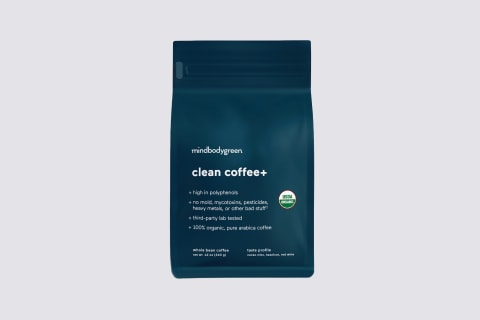Advertisement
5 Ways To Make Your Coffee Easier On The Stomach If You Drink First Thing In The Morning


I've said it before and I'll say it again: There's nothing better than rolling out of bed in the morning and brewing some fresh coffee. And I'm not the only one who thinks so—three out of four1 Americans drink coffee, and one out of two drink it every day.
But what happens when your coffee starts turning against you, causing indigestion, heartburn, or anxiousness?
We sat down with functional nutritionist Abigail King, M.S., CNS, to learn why coffee might upset your stomach and what you can do to enjoy your favorite morning beverage without uncomfortable side effects.
Coffee: the pros and cons
According to King, while coffee is one of the most beloved beverages in the world, there are some pros and cons of drinking it daily. Let's start out with the pros.
A big pro is its high antioxidant content: "Coffee contains certain polyphenols, like chlorogenic acid and ferulic acid, that exert anticancer activities2 by protecting critical cellular molecules (DNA, proteins, and lipids) from oxidative damage," explains King.
When it comes to gut health, coffee can also help keep you regular if you struggle with constipation. How does that work, exactly? "Coffee increases colonic activity.3 It may trigger contractions in your colon and help you to use the bathroom," says King.
That said, sipping coffee can also present challenges in the gut health department. How? "If you have IBS/IBD, coffee can aggravate your gut and exacerbate your symptoms," says King. "Because coffee increases colonic activity, it can cause diarrhea in those that already are prone to loose stool," she continues.
You might also find your morning cup of coffee triggers acid reflux, especially if you've been diagnosed with GERD. As King explains it, this is because "Coffee contains compounds that can stimulate acid secretion in the gut4, including caffeine and catechols."
How to make your coffee more gut-friendly
If you have acid reflux or IBS or IBD and find that coffee aggravates your symptoms, you may want to explore ways to mitigate the effects of your morning cup.
The good news is that according to King, this doesn't have to mean no coffee at all. There are a handful of ways to make your morning coffee easier on your stomach, including:
- Eat before you drink: Combining coffee with some food will help ease digestion and make it less intense on the stomach. But avoid eating meat, grains, or sugar, as those are also acidic. Instead, opt for fruit, veggies, or healthy fats like avocado.
- Wait an hour or more: Many health experts—including Andrew Huberman, Ph.D., a Stanford University neuroscientist—recommend delaying coffee at least an hour after waking up. In addition to supporting your natural circadian rhythm, this delay might make you less likely to reach for a second cup later in the day, which could help out your gut.
- Reduce your overall coffee intake: "Watch your dose!" says King. "If you're drinking three to four cups, try reducing it to one or two. Many people use coffee as a stimulant and end up drinking multiple cups throughout the day as an energy boost. "This can definitely cause stomach upset," she explains.
- Try an alternative: It may be that a temporary break from coffee is necessary. In that case, "you can try an alternative caffeinated beverage, like black tea or matcha," says King. Or, if you're looking to reduce your caffeine intake, you can try mushroom coffee. The right daily supplement can also lend the same brain-boosting effects without the stomach upset. Here are 16 of the most effective for mood balance, cognition, and more.
- Add milk: According to a recent preliminary study, adding milk to your coffee may have anti-inflammatory effects5 due to the special combination of polyphenols in coffee and amino acids in milk.
The takeaway
If your gut is struggling with your morning coffee, it may be because of the acid content. Try one of these seven tips for making your beloved morning brew easier on your stomach so you can keep sipping.
